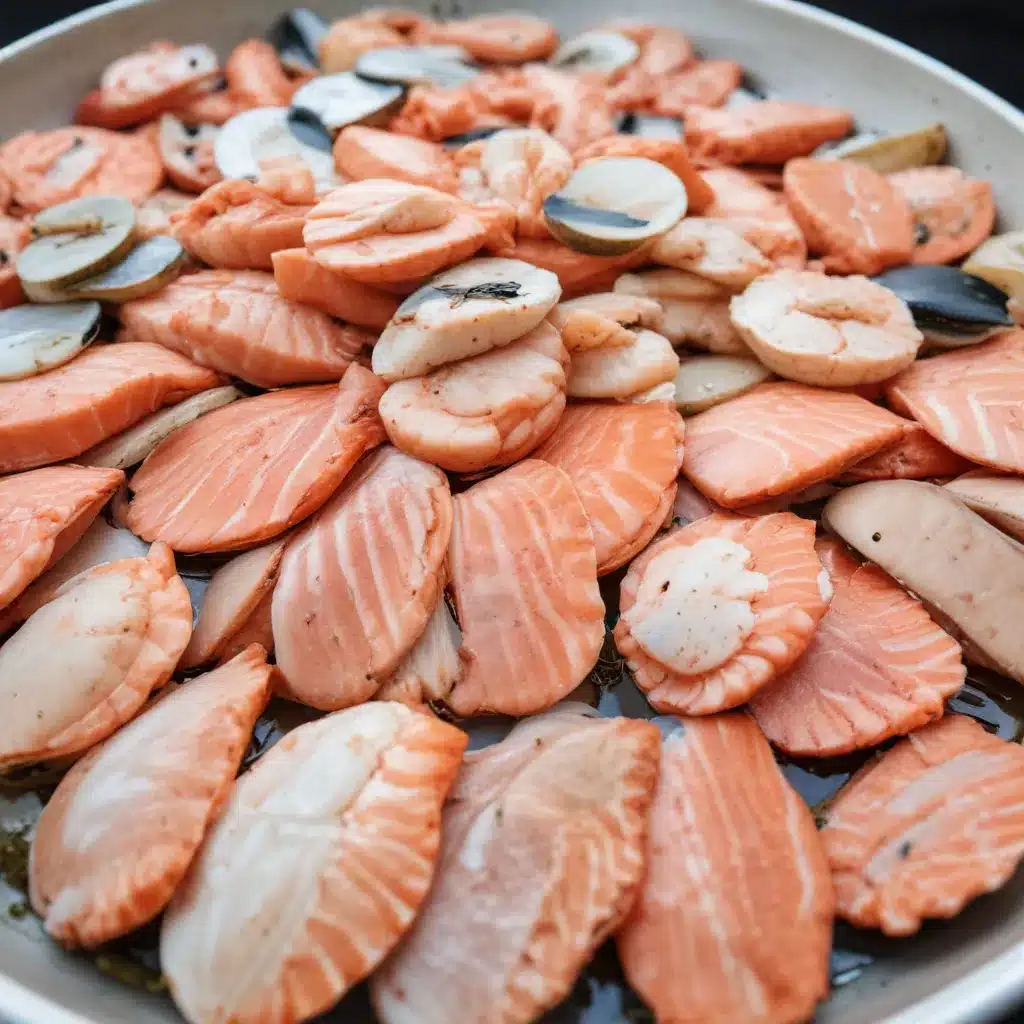
In today’s complex seafood landscape, navigating the myriad of certification programs and sustainability labels can feel overwhelming. However, as seafood enthusiasts and conscious consumers, it’s crucial that we arm ourselves with the knowledge to make informed choices that protect our ocean’s resources while supporting ethical fishing and aquaculture practices.
Certification Programs: Ensuring Responsible Sourcing
At the forefront of sustainable seafood are the certification programs that evaluate the environmental and social impacts of fisheries and aquaculture operations. Two of the most prominent organizations in this space are the Marine Stewardship Council (MSC) and the Aquaculture Stewardship Council (ASC).
The MSC certification program focuses on the sustainability of wild-caught seafood, setting rigorous standards for fishery management, bycatch mitigation, and habitat protection. When you see the iconic blue MSC label, you can trust that the fish was sourced from a well-managed, environmentally responsible fishery.
In the realm of farmed seafood, the ASC certification provides assurance that the aquaculture practices meet stringent criteria for minimizing pollution, preserving biodiversity, and ensuring the welfare of farmed species. The ASC logo on a product signals that it was produced with a reduced environmental impact.
Another valuable resource is the Seafood Watch program, which evaluates the sustainability of seafood species and provides consumer-friendly recommendations on which options to choose, categorizing them as “Best Choices,” “Good Alternatives,” or “Avoid.”
Certification Criteria: Prioritizing Sustainability
These certification programs assess seafood sustainability across several key criteria:
Environmental Impact: Certifications examine the fishing or aquaculture methods used, ensuring they minimize harm to marine ecosystems, reduce bycatch, and maintain the long-term health of fish populations.
Traceability: Robust chain-of-custody requirements enable certifications to verify the origin and journey of seafood products, mitigating the risk of mislabeling or fraud.
Fishery Management: Effective fishery management practices, such as science-based catch limits and enforcement of regulations, are essential for upholding the sustainability of wild-caught seafood.
Consumer Awareness: Making Informed Choices
As consumers, understanding these certification labels is crucial in navigating the seafood aisle and making responsible purchasing decisions. Look for the MSC, ASC, and Seafood Watch logos to identify seafood that has been rigorously assessed and verified as sustainable.
Beyond the labels, it’s beneficial to familiarize yourself with common seafood species, their sustainability status, and the various fishing or farming methods used. This knowledge will empower you to make more informed choices, even when you don’t have the time to consult a guide.
Developing sustainable purchasing habits, such as supporting local and regional fisheries, exploring lesser-known seafood species, and reducing your overall seafood consumption, can also contribute to the long-term health of our oceans.
Seafood Sustainability Challenges
Despite the advancements in sustainable seafood certifications, the global seafood industry continues to face significant challenges that threaten the long-term viability of marine ecosystems.
Overfishing: The depletion of fish stocks due to unsustainable fishing practices, such as the use of destructive gear and the targeting of vulnerable or endangered species, remains a pressing concern. Bycatch, the unintentional capture of non-target species, can also have devastating impacts on marine biodiversity.
Aquaculture Concerns: While aquaculture has the potential to ease the pressure on wild-caught seafood, certain farming practices can contribute to pollution, habitat destruction, and the overexploitation of wild fish populations for feed.
Climate Change Impacts: The warming and acidification of our oceans, driven by climate change, are altering the distribution and abundance of fish species, posing challenges for fisheries and aquaculture operations.
Responsible Sourcing Strategies
To address these challenges, consumers can adopt various strategies to support sustainable seafood practices.
Local and Regional Seafood: Prioritizing locally or regionally sourced seafood not only reduces the carbon footprint associated with transportation but also helps support local economies and preserves traditional fishing communities.
Seasonality and Variety: Embracing a diverse range of seafood species, including lesser-known or underutilized options, can ease the pressure on heavily fished stocks and encourage sustainable fishing practices.
Transparency and Traceability: Seeking out suppliers and retailers that prioritize transparency in their seafood supply chains can help ensure the products you purchase are responsibly sourced.
Seafood Labeling and Certification Schemes
While certification programs offer a valuable framework for identifying sustainable seafood, it’s important to be aware of the limitations and potential pitfalls of these systems.
Eco-Label Credibility: Not all seafood labels or claims of sustainability are created equal. Consumers should look for third-party certifications, such as those from the MSC or ASC, which undergo rigorous assessment and auditing processes.
Certification Limitations: Certain geographic regions or species may be underrepresented in existing certification schemes, and some programs may face challenges in keeping up with the dynamic nature of fisheries and aquaculture.
Empowering Consumers
Ultimately, the path to a more sustainable seafood future lies in the hands of informed and engaged consumers. By educating ourselves, collaborating with businesses and policymakers, and supporting community-based initiatives, we can drive meaningful change.
Seafood Sustainability Education: Accessing reliable information from reputable sources, such as Seafood Watch and sustainable seafood advocacy groups, can help us make more informed choices.
Community-Based Initiatives: Participating in citizen science projects, supporting local fisheries, and engaging in collaborative policymaking can amplify our collective impact on seafood sustainability.
By understanding the nuances of sustainable seafood certification, navigating the challenges, and embracing responsible sourcing strategies, we can become empowered advocates for the health of our oceans. Your choice to support certified sustainable seafood today can have a lasting positive impact on marine ecosystems and the communities that depend on them.
Visit Fish Tales Cafe to explore our selection of responsibly sourced seafood and learn more about sustainable culinary practices.

